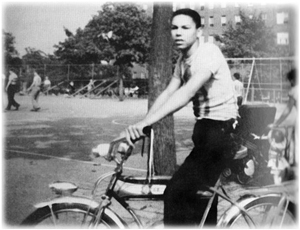

Retired four-star general in the United States Army, chairman of the Joint Chiefs of Staff, and U.S. secretary of state
(1937– )
I wasn’t much of an athlete as a kid, but I liked playing all the street games, especially one that involved kites. Do you remember the trolleys? We’d take some empty soda bottles, put them into tin cans, and then put them on the trolley tracks. Then when the trolleys came by they’d smash the cans and pulverize the glass so that it was like a powder. We’d glue the powdered glass onto the kite string and attach razor blades to this long tail we had made with torn-up sheets. Then we’d fly the kites on our rooftops and try to cut the kites of the other kids, and some of those kids were on rooftops a block away. It was our version of being in World War Two, shooting down planes.
We never thought of ourselves as living in the slums. We lived in tenements, not slums. We didn’t think of ourselves as terribly poor. Our parents worked hard and their aspirations and all our relatives’ aspirations had to do with getting an education and getting a job. Not necessarily getting a college education, but working and earning money to support oneself and one’s family, with the highest goal that of getting a job with a pension.
I was fortunate to have a tight family. Outside of my immediate family of my mother, father, and sister, there were also aunts, uncles, cousins, and close family friends who lived on our street, Kelly Street, in the Hunts Point section of the South Bronx. The Bronx is like a small town, where everyone knows everyone else and everyone else’s business. I found that comforting. The neighborhood was warm and embracing with everything I cared about being within a few blocks of where I lived: the schools, the church that we went to, the library, the stores. The stores especially defined the neighborhood for me.
There was Teitelbaum’s drugstore. My sister was best friends with their daughters. Across the street was Kaiserman’s bakery. Then on 163rd Street there was a tailor and dry cleaner. There was the Puerto Rican bodega, the Chinese laundry, a kosher chicken market, and then there were the candy stores, also usually owned by European Jews. Remember the egg cream? It never had an egg in it. The candy store also sold newspapers. No one in the neighborhood ever read the New York Times. The only newspapers we read were the Mirror, the Post, and the Daily News.
There was an Orthodox synagogue across from Teitelbaum’s. I used to earn a quarter to turn the lights on and off on the Sabbath, which religious Jews are not allowed to do themselves. I was the Shabbos goy, the non-Jew who was able to work on the Sabbath when Jews were forbidden to do so.
Starting at age fourteen, I worked in a store owned by Jay Sickser, a Jewish storekeeper in our neighborhood who sold baby furniture and toys and spoke with a thick Jewish accent. It was there that I eventually picked up some Yiddish words and phrases. The customers, of course, never knew that. I understood enough to be able to report what I heard to Mr. Sickser so that he knew what the customers were saying to one another about getting a good deal. With that information he would be able to talk to the customer and close the deal.
But the best place was Sammy Fiorino’s, the Italian shoemaker’s shop, which was where we used to hang out and play poker. Nickel-and-dime stuff. There were off-duty cops who were playing with us when some new cops came in to break up the game. They left us alone when they found out who was there. We set them straight.
I had a bike and I used to ride it to Pelham Bay Park, which was a good distance, but when our family went to Orchard Beach, which was part of that park, we all jammed into our car. Once a year, though, we had to go to Jones Beach, for a dip. We went there because our parents believed that the dip would protect us for the whole year against getting sick. Orchard Beach was on Long Island Sound. It wasn’t the ocean. Jones Beach was on the ocean, and that made a big difference to them.
Do you remember those Dollar Savings accounts? I used to save my earned money in my account and my parents also put money aside for me. By the time I graduated from college, my father emptied that account and gave me six hundred dollars. That was a lot of money in those days.
Early on in school I was just trying to survive, but there were a lot of things I learned that were part of our education that I will always be thankful for. We had something called arts appreciation. I’ll never forget listening to Ravel’s Bolero and feeling how beautiful that music was. And seeing a Rembrandt painting, probably shown with an old lantern-slide projector.
They also had something called religious instruction. That meant that on Tuesday afternoons you got out of school an hour early to go to the church or synagogue that you belonged to. The Catholics went to their church, the Jews went to their shul, and the Episcopalians, like me, went home. I loved that.
In our whole large family we have a lot of professionals, and there has never been a divorce. That doesn’t mean that everyone was always happy, but it does mean that the family itself was valued and keeping it together was important.